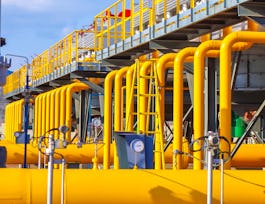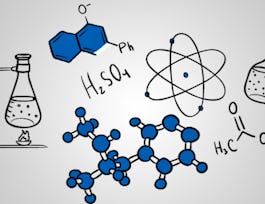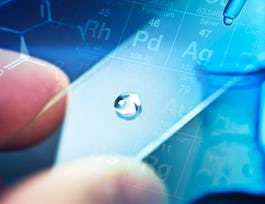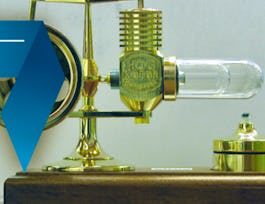Course 4 of Statistical Thermodynamics addresses dense gases, liquids, and solids. As the density of a gas is increased, intermolecular forces begin to affect behavior. For small departures from ideal gas behavior, known as the dense gas limit, one can estimate the change in properties using the concept of a configuration integral, a modification to the partition function. This leads to the development of equations of state that are expansions in density from the ideal gas limit. Inter molecular potential energy functions are introduced and it is explored how they impact P-V-T behavior. As the density is increased, there is a transition to the liquid state. We explore whether this transition is smooth or abrupt by examining the stability of a thermodynamic system to small perturbations. We then present a brief discussion regarding the determination of the thermodynamic properties of liquids using concept of the radial distribution function (RDF), and how the function relates to thermodynamic properties. Finally, we explore two simple models of crystalline solids.



Dense Gases, Liquids and Solids
This course is part of Statistical Thermodynamics Specialization

Instructor: John W. Daily
Sponsored by IEM UEM Group
5,440 already enrolled
(112 reviews)
What you'll learn
Analyze the impact of intermolecular forces on the transition of gases to liquids as density increases
Evaluate the stability of a thermodynamic system as it transitions from gas to liquid state in response to small perturbations
Assess the role of the radial distribution function (RDF) in determining thermodynamic properties of liquids
Describe the behavior of crystalline solids using simple statistical thermodynamics
Skills you'll gain
Details to know

Add to your LinkedIn profile
4 assignments
See how employees at top companies are mastering in-demand skills

Build your subject-matter expertise
- Learn new concepts from industry experts
- Gain a foundational understanding of a subject or tool
- Develop job-relevant skills with hands-on projects
- Earn a shareable career certificate


Earn a career certificate
Add this credential to your LinkedIn profile, resume, or CV
Share it on social media and in your performance review

There are 4 modules in this course
As the density of a gas is increased, intermolecular forces begin to affect behavior. For small departures from ideal gas behavior, known as the dense gas limit, one can estimate the change in properties using the concept of a configuration integral, a modification to the partition function. This leads to the development of equations of state that are expansions in density from the ideal gas limit. Inter molecular potential energy functions are introduced and it is explored how they impact P-V-T behavior.
What's included
4 videos4 readings2 discussion prompts
As the density is increased, there is a transition to the liquid state. We explore whether this transition is smooth or abrupt by examining the stability of a thermodynamic system to small perturbations. We also explore Gibb's phase rule.
What's included
3 videos3 readings1 assignment1 discussion prompt
In this Module we present a brief discussion regarding the determination of the thermodynamic properties of liquids using the concept of the radial distribution function (RDF), and how the function relates to thermodynamic properties. This includes introducing the use of molecular dynamics to obtain the radial distribution function.
What's included
3 videos3 readings1 discussion prompt
It turns out that we can use the results of simple statistical thermodynamics to describe the behavior of crystalline solids.
What's included
2 videos2 readings3 assignments
Instructor

Offered by
Why people choose Coursera for their career




Learner reviews
112 reviews
- 5 stars
70.53%
- 4 stars
16.07%
- 3 stars
7.14%
- 2 stars
1.78%
- 1 star
4.46%
Showing 3 of 112
Reviewed on Jun 1, 2020
Amazing course for statistical thermodynamics. Learned the origins of specific heat for solids and how they are calculated.
Reviewed on Apr 10, 2021
Great course to learn about Dense Gases, Liquids, and Solid. I highly recommend this course.
Reviewed on Aug 29, 2020
It is a good course. It teaches you patience and equally to work hard
Recommended if you're interested in Physical Science and Engineering

University at Buffalo

University of Kentucky
École Polytechnique Fédérale de Lausanne

Arizona State University

Open new doors with Coursera Plus
Unlimited access to 10,000+ world-class courses, hands-on projects, and job-ready certificate programs - all included in your subscription
Advance your career with an online degree
Earn a degree from world-class universities - 100% online
Join over 3,400 global companies that choose Coursera for Business
Upskill your employees to excel in the digital economy



